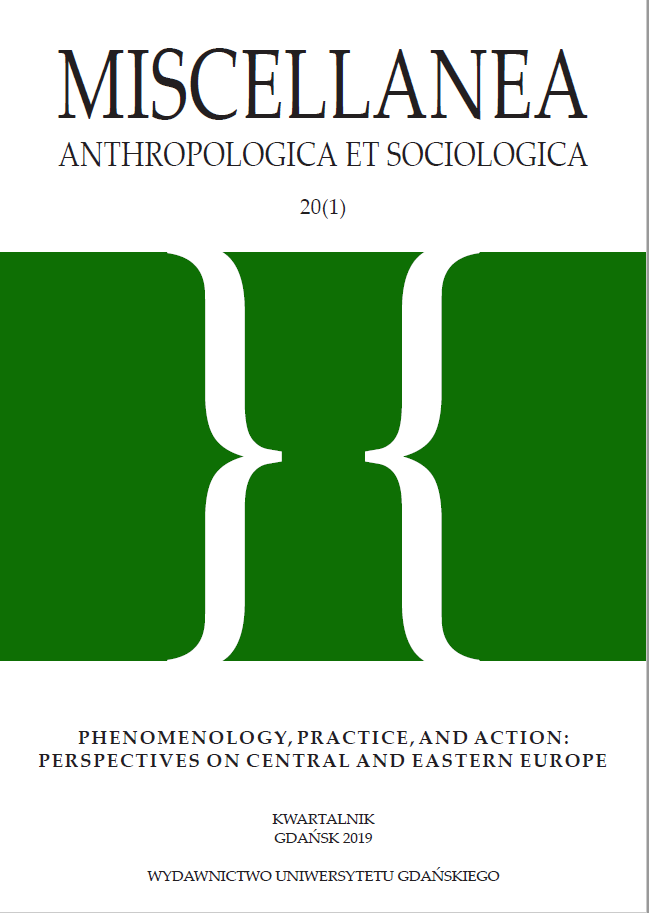On Empathy. E. Stein and R. Ingarden vs. Cognitive Psychology
DOI:
https://doi.org/10.26881/maes.2019.1.02Słowa kluczowe:
cognitive science(s), empathy, R. Ingarden, mind-body problem, mind-reading, phenomenology, E. SteinAbstrakt
In this paper I compare (using as paradigmatic examples E. Stein and R. Ingarden) phenomenological theories of empathy (understood as “mind-reading”) with contemporary cognitivists’ approach to this issue, arguing that although they are prima facie incompatible, in fact they can be seen as complementary. Since empathy is indispensable in practice, a correct conceptualization of this topic is desirable.
Downloads
Bibliografia
Baillargeon R., Onishi K., 2005, Do 15-month-old-infants understand false beliefs?, Science, no. 308, pp. 255–258.
Botterill G., Carruthers P., 1999, The Philosophy of Psychology, Cambridge: Cambridge University Press.
Chmielecki A., 2013, Podstawy psychoniki. Ku alternatywie dla cognitive science [The foundations of psychonics. Towards the alternative to cognitive science], Warszawa: Instytut Filozofii i Socjologii Polskiej Akademii Nauk.
Damasio A., 2000, Tajemnica świadomości [original title: The Feeling of what happens], transl. M. Karpiński, Poznań: Rebis.
Heller M., 2012, Spór o realizm strukturalistyczny [The controversy over structural realism] [in:] M. Heller, Filozofia i wszechświat [Philosophy and the universe], Kraków: Universitas.
Ingarden R., 1987, Spór o istnienie świata [The controversy over the existence of the world], vol. 2, part 1, Warszawa: Państwowe Wydawnictwo Naukowe.
Ingarden R., 1987a, Spór o istnienie świata [The controversy over the existence of the world], vol. 2, part 2, Warszawa: Państwowe Wydawnictwo Naukowe.
Leszczyński D., 2014, Fenomenologia, naturalizm i nauka [Phenomenology, naturalism and science] [in:] W. Płotka (ed.), Wprowadzenie do fenomenologii. Interpretacje, zastosowania, problemy [Introduction to phenomenology: interpretations, applications, problems], vol. 1, Warszawa: Instytut Filozofii i Socjologii Polskiej Akademii Nauk.
Płotka W., 2015, Studia z fenomenologii poznania. Transcendentalna filozofia Edmunda Husserla a problem wiedzy [Studies in the Phenomenology of Cognition. Transcendental Philosophy of Edmund Husserl and the Problem of Knowledge], Gdańsk: Wydawnictwo Uniwersytetu Gdańskiego.
Sider T., 2001, Four-dimensionalism. An ontology of persistence and time, Oxford: Clarendon Press.
Simion F., Regolin L., Bulf H., 2008, A predisposition for biological motion in the newborn baby, Proceedings of the National Academy of Sciences of the USA, no. 105, pp. 809–813.
Stein E., 1989, On the problem of empathy, transl. W. Stein, Washington, D.C.: Institute of Carmelite Studies Publications.
Urbaniak R., 2016, Lekko nieodpowiedzialne i stronnicze wprowadzenie do filozofii analitycznej [A slightly irresponsible and biased introduction to analytical philosophy], Lublin: Academicon.
Zahavi D., 2001, Beyond Empathy. Phenomenological Approaches to Intersubjectivity, Journal of Consciousness Studies, vol. 8, no. 5–7, pp. 151–167.
Zahavi D., 2010, Empathy, Embodiment and Interpersonal Understanding: From Lipps to Schutz, Inquiry, vol. 53, no. 3, pp. 285–306.

 Uniwersyteckie Czasopisma Naukowe
Uniwersyteckie Czasopisma Naukowe




